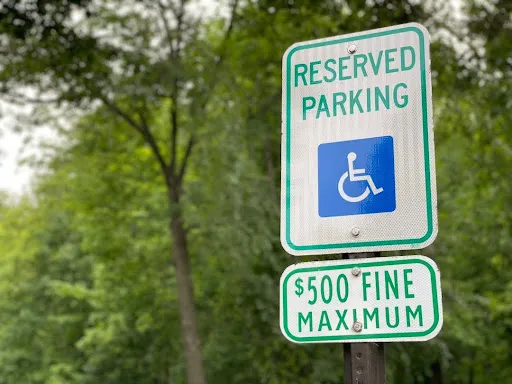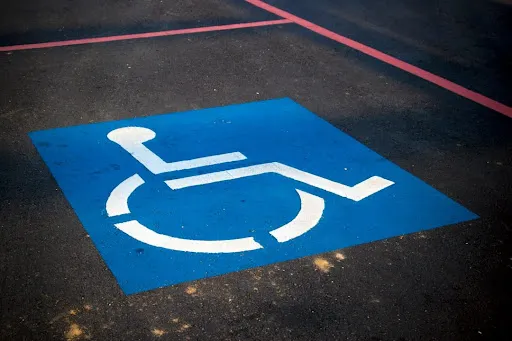
Navigating ADA compliance requirements for commercial parking lots can feel overwhelming for California business owners and property managers. However, understanding these essential regulations protects your business from costly violations while demonstrating commitment to accessibility and community inclusion. The Asphalt Jungle has helped Los Angeles and Ventura County businesses achieve full ADA compliance for over 40 years, transforming complex regulations into straightforward, implementable solutions.
As a family-owned company, we believe accessibility benefits everyone in our community. Our four decades of experience working with hospitals, medical facilities, educational institutions, and retail centers has taught us that proper ADA compliance isn’t just about avoiding penalties—it’s about creating welcoming environments that serve all customers and employees effectively.
Understanding ADA Parking Requirements
The Americans with Disabilities Act establishes specific parking requirements that apply to all California businesses open to the public. These federal standards are supplemented by California accessibility regulations that often exceed federal minimums, creating comprehensive requirements that protect businesses from both federal and state enforcement actions.
Minimum accessible space requirements depend on your parking lot’s total capacity. Facilities with 1-25 spaces need one accessible space, while larger lots require additional spaces at specific ratios. Lots with 26-50 spaces need two accessible spaces, 51-75 spaces require three, and the requirements continue scaling upward. Properties with over 500 spaces must provide 2% of total spaces as accessible parking.
Van-accessible spaces represent a critical subset of accessible parking requirements. At least one accessible space (or one per six accessible spaces in larger facilities) must accommodate wheelchair-accessible vans. These spaces require additional width and vertical clearance that standard accessible spaces don’t provide.
The Asphalt Jungle’s expertise in California accessibility requirements ensures your parking lot meets both current standards and anticipated future updates. Our team stays current with regulatory changes and enforcement trends that affect compliance obligations.
Proper Space Dimensions and Layout
ADA-compliant parking spaces require specific dimensions and layout configurations that differ significantly from standard parking spaces. Understanding these requirements prevents costly reconstruction and penalties when violations are discovered during inspections or complaints.
Standard accessible spaces must measure at least 8 feet wide with 5-foot access aisles, creating 13-foot total widths compared to typical 9-foot standard spaces. However, two adjacent accessible spaces may share a single 5-foot access aisle, improving space efficiency while maintaining compliance.
Van-accessible spaces require 8-foot widths with 8-foot access aisles, totaling 16 feet per space. These spaces must also provide 98 inches of vertical clearance, which rarely affects surface parking but impacts covered structures.
Access aisle requirements extend beyond simple width specifications. These areas must connect directly to accessible routes leading to building entrances, cannot have slopes exceeding 2% in any direction, and must remain free of obstructions including light poles, landscaping, and utility equipment.
Location standards require accessible spaces to be positioned as close as possible to building entrances, with travel distances minimized through strategic placement. The Asphalt Jungle evaluates your property layout to optimize accessible space locations while maintaining compliance with maximum distance requirements.
Slope and Surface Requirements
Proper slope and surface specifications ensure accessible parking spaces provide safe, usable access for individuals with disabilities. These technical requirements often present the greatest compliance challenges for existing parking lots.
Maximum slope requirements limit accessible spaces and access aisles to 2% grade in any direction. This seemingly simple requirement becomes complex when existing parking lots have inadequate drainage or were constructed before current standards. Even minor grade violations can trigger compliance issues during accessibility audits.
Surface specifications require stable, firm, slip-resistant materials that accommodate wheelchairs and mobility devices. Standard asphalt and concrete surfaces typically meet these requirements when properly installed and maintained, but deteriorated surfaces with cracks, potholes, or loose aggregate create compliance violations.
Drainage considerations must balance accessibility requirements with proper water management. The Asphalt Jungle’s expertise in both drainage engineering and ADA compliance ensures solutions that prevent standing water while maintaining required slope limitations.
Our team uses precision grading equipment and laser-guided installation techniques to achieve compliance-level slopes while maintaining attractive appearances and proper drainage performance.
Signage and Marking Specifications
Proper signage and marking represent visible compliance elements that accessibility enforcement often scrutinizes first. These requirements involve specific dimensions, colors, symbols, and placement that must meet exact specifications.
Parking space markings must include the International Symbol of Accessibility painted in blue on white backgrounds. These symbols require specific proportions and placement within each accessible space, with van-accessible spaces requiring additional “Van Accessible” text beneath the symbol.
Vertical signage must display the International Symbol of Accessibility on signs positioned so they cannot be obscured by parked vehicles. Signs must meet height, color contrast, and visibility requirements while incorporating specific text and symbol specifications.
“No Parking” designations for access aisles require clear marking and signage that prevents unauthorized parking in these critical areas. The Asphalt Jungle ensures access aisle markings remain visible and enforceable through proper paint selection and maintenance scheduling.
Fine amount postings may be required by local jurisdictions, with specific text, font sizes, and placement requirements that vary by location. Our team coordinates with local authorities to ensure complete compliance with regional requirements.
Path of Travel and Accessibility Routes
ADA compliance extends beyond parking spaces to encompass accessible routes connecting parking areas to building entrances. These pathway requirements often determine parking lot layout and design decisions.
Accessible route specifications require 36-inch minimum widths with passing spaces every 200 feet where routes don’t provide 60-inch widths. Routes cannot exceed 5% running slope or 2% cross slope, creating significant design challenges for properties with natural grade variations.
Surface requirements for accessible routes mirror parking space specifications, requiring stable, firm, slip-resistant materials that accommodate mobility devices. Changes in level exceeding ¼ inch require ramp installations with specific slope and handrail requirements.
Curb ramp installations must provide smooth transitions between parking areas and sidewalks or building entrances. These ramps require specific slope ratios, width requirements, and tactile warning surfaces that meet federal and California specifications.
The Asphalt Jungle’s comprehensive approach evaluates entire circulation patterns to ensure seamless accessibility from parking spaces to building entrances, eliminating barriers that could trigger compliance violations.
Common Compliance Violations and Penalties
Understanding common ADA violations helps businesses avoid costly penalties while ensuring genuine accessibility. California businesses face both federal enforcement and state accessibility violations that can result in significant financial penalties.
Inadequate space quantities represent frequent violations when businesses expand capacity without adding required accessible spaces. Parking lot additions or reconfigurations trigger compliance reviews that often reveal grandfathered violations requiring immediate correction.
Improper dimensions for spaces, access aisles, or accessible routes create violations even when good-faith compliance efforts were attempted. Precision installation and regular maintenance are essential for maintaining compliance over time.
Missing or incorrect signage provides visible evidence of compliance failures that enforcement agencies and private attorneys frequently target. Faded paint, damaged signs, or incorrect specifications create liability exposure disproportionate to correction costs.
Enforcement penalties can include federal fines, state accessibility violations, and private lawsuit settlements. California’s Unruh Civil Rights Act allows individuals to seek monetary damages for accessibility violations, creating significant financial exposure beyond government penalties.
Maintenance and Long-Term Compliance
Achieving initial ADA compliance represents only the beginning of ongoing obligations. Proper maintenance ensures continued compliance while protecting your business from future violations.
Regular inspection schedules should evaluate paint visibility, sign condition, surface integrity, and slope maintenance. The Asphalt Jungle provides compliance inspection services that identify potential issues before they become enforcement problems.
Preventive maintenance programs address surface deterioration, drainage issues, and marking fade that can compromise compliance over time. Scheduled maintenance costs significantly less than emergency compliance corrections triggered by violations.
Documentation practices should maintain records of compliance efforts, maintenance activities, and professional assessments. These records demonstrate good-faith compliance efforts that can influence enforcement responses and legal proceedings.
Partner with The Asphalt Jungle for Complete Compliance

The Asphalt Jungle’s 40+ years of ADA compliance experience ensures your California business meets all accessibility requirements while avoiding costly violations and penalties. Our comprehensive understanding of federal ADA standards, California accessibility regulations, and local requirements provides complete protection for your business.
We offer detailed compliance assessments, precise installation services, and ongoing maintenance programs that keep your parking lot compliant year after year. Our licensed and bonded team works efficiently to minimize business disruption while ensuring complete regulatory compliance.
Contact The Asphalt Jungle today for your free ADA compliance evaluation. Discover how our expertise can protect your business while creating truly accessible environments that welcome all customers and employees.

